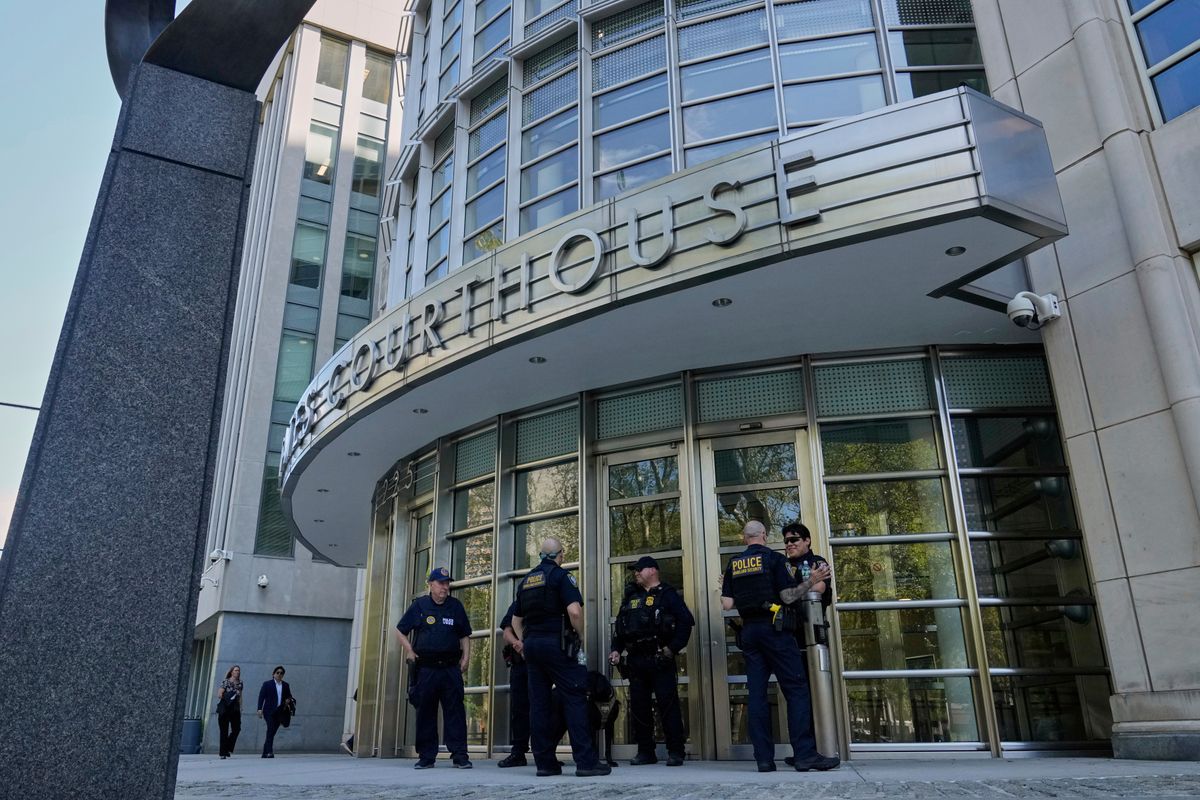NEW YORK (AP) — A convicted drug dealer who had been granted clemency by President Donald Trump was sent back to federal prison on Monday for violating the terms of his release after being charged with several new crimes.
Jonathan Braun was sentenced to 27 months behind bars. The Long Island man had been accused of swinging an IV pole at a hospital nurse and threatening to kill her, screaming at a member of his synagogue, groping his family’s nanny and evading bridge tolls.
Braun, speaking in a Brooklyn federal court hearing attended by family and supporters, apologized to his victims and loved ones, who he acknowledged had tried to get him help for his substance abuse and mental health problems before he spiraled out of control.
“I have no one to blame but me,” he said.
Braun also thanked Judge Kiyo Matsumoto for ordering him detained following his arrest earlier this year, saying the past seven months locked up in a Brooklyn federal jail “saved my life” by helping him get sober.
Matsumoto, for her part, said she hoped Braun’s “expressions of remorse” and promises to “lead a law-abiding life” were in good faith, noting that many of the people who he had harmed have since forgiven him.
“Don’t squander it,” she said to Braun.
Braun was sentenced to 10 years in federal prison in 2019 after pleading guilty to drug-related charges. He served about a year behind bars before Trump commuted his sentence in the final days of his first term in January 2021. Braun was freed from prison, but the rest of his sentence remained intact, including requirements that he pay a fine and stay out of trouble.
Braun had been a high-ranking member of an international group that smuggled more than 100,000 kilograms (220,460 pounds) of marijuana from Canada into the United States, federal prosecutors said at the time.
Braun’s former live-in nanny attended Monday’s proceedings by phone and asked prosecutors to read her statement in court.
In it, she said she was “grateful that justice had been served” as she had not only lost her job, but also “endured deep emotional trauma” that left her “with lasting trust issues.”
The Associated Press does not identify people who say they’re victims of sexual abuse unless they choose to make their names public.
Edward Miller, the synagogue congregant Braun allegedly threatened, recalled how Braun had gone on a drug-fueled “rampage” in their affluent Long Island community, “freaking out all over the place.”
Still, he felt that additional prison time would only worsen his condition, which he believed was better treated in a professional treatment setting.
“He’s not a hardened criminal,” Miller said. “He’s a sick man.”
Prosecutors had sought a five-year sentence, the maximum punishment allowed, arguing Braun’s “brazen and violent conduct” had “caused fear and terror in his victims” and showed he remained a “serious danger to the community.”
“This defendant has had many, many chances,” Assistant U.S. Attorney Tanya Hajjar said in court.
But Braun’s federal public defender, Kathryn Wozencroft, argued for his immediate release, saying he’s taken steps to rebuild his life while behind bars, including meeting with a psychiatrist and talking with a rabbi twice a week.
Braun’s conduct, she said, was driven by “a pretty significant psychiatric crisis” fueled by hallucinogenic drugs.
In January, prosecutors said, Braun cursed emergency department staff at a Long Island hospital, picking up an IV pole that was connected to his arm and swinging at a nurse as she approached and attempted to calm him down.
In February, prosecutors said, Braun entered the bedroom of his children’s live-in nanny, wrapped an arm around her upper body and used the other to put her in a headlock before grabbing her breasts and making unwanted sexual advances. The nanny testified in court that Braun’s actions made her so uncomfortable that she locked herself in a bathroom, called her husband and asked him to notify police.
In March, prosecutors said, Braun grabbed and threatened a fellow worshipper who asked him to be quiet during a synagogue service. After stepping away for about 10 minutes, Braun allegedly got in the man’s face, squeezed his right arm tightly and asked him: “Do you know who I am?” and “Do you know what I could have done to you?”
Braun’s infractions didn’t end there. Last summer, police said, he evaded bridge tolls at least 40 times while driving his luxury cars, accruing $160 in unpaid fees.
He also failed to make payments toward his court-ordered fine despite living in a multimillion-dollar home, driving luxury vehicles and taking international vacations, prosecutors said.
By PHILIP MARCELO and MICHAEL R. SISAK
Associated Press


